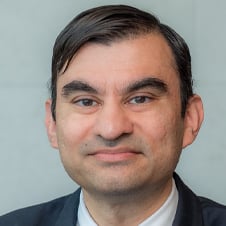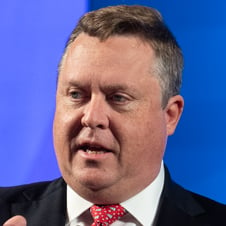In Odessa, Texas, allergist and immunologist Vivek Rao, MD, has for nearly two decades taken care of some of the sickest Medicare patients—just as his father did before him as a gastroenterologist in the West Texas city famed as the setting of the hit TV show “Friday Night Lights.”
But in a town where football brings out thousands to cheer on their high-school gods of the gridiron, Dr. Rao said he will have to go back to the drawing board to keep his solo practice alive if next year’s 3.37% Medicare physician pay cut takes effect as scheduled in January.
“All options are on the table,” said Dr. Rao, who represents the Texas Medical Association as an alternate delegate in the AMA House of Delegates.
The cut would come on top of this year’s 2% pay cut and while virtually every other type of provider gets annual, inflationary pay updates from Medicare, physicians don’t. After adjusting for inflation, physician pay actually fell by 26% since 2001.
Dr. Rao was among the hundreds of practicing physicians who gathered near Capitol Hill this week for the 2023 AMA Interim Meeting. Through their actions, the House of Delegates made it unmistakably clear that the unsustainable Medicare payment system poses a dire threat to patients’ access to high-quality physician care across the nation.
“Years of those cuts has gotten to the point where, as far as ‘trimming the fat,’ everything that can be done without jeopardizing patient care has been done,” Dr. Rao said in an interview.
“Any other cuts that are going to be made in the way the practice is being run—trying to make the practice ‘more efficient’—is going to affect patient care negatively,” Dr. Rao said. “And that's where we're at, and a lot of physicians are at the point where I don't want to do that. I don't want to jeopardize patient care that way.”
Dr. Rao’s next move could be one he dreads—the painful choice to leave Odessa, the place where he grew up.
To help Dr. Rao and the other physicians who provide vital care to the estimated 65 million Americans enrolled in Medicare, the House of Delegates adopted new policy to “continue to prioritize reforming the Medicare payment system to ensure the continued economic viability of medical practice.”
The delegates also directed the AMA to:
- Prioritize preventing the imminent 3.37% Medicare payment cut from taking effect by any means available.
- Work toward achieving the highest sustainable annual Medicare payment increases possible, whether tied to the Medicare Economic Index, the consumer price index or some other relevant measure of inflation that is sufficient to ensure that Medicare beneficiaries can receive robust access to care and that medical practices do not continue to encounter economic challenges as a result of insufficient payment updates.
- Immediately create and disseminate, in major news outlets, a press release outlining the current problems within the Medicare system and how it will affect access to care with a call to action to help those with Medicare keep their physicians and the high quality care they deserve.
“Physicians heed the idea of ‘first do not harm,’” AMA President Jesse M. Ehrenfeld, MD, MPH, said in a statement. “Yet the payment system year after year inflicts harm on the ability of physician practices to stay afloat. We also are aware of the First Law of Holes. When you find yourself in one, stop digging. We are in a veritable crater. Cutting payments is only taking us deeper.”
Leading the charge to reform Medicare pay is the first pillar of the AMA Recovery Plan for America’s Physicians.
The AMA has challenged Congress to work on systemic reforms and make Medicare work better for you and your patients. Our work will continue, fighting tirelessly against future cuts—and against all barriers to patient care.
Physicians use their voices
During the opening session of the Interim Meeting, nearly 700 physicians and medical students chanted “fix Medicare now” and held aloft signs calling for immediate changes to help protect American seniors’ access to care.
Many also visited the AMA’s Fix Medicare Now website, where it is easy for physicians, patients and others to write their representatives in Congress to support H.R. 2474, the Strengthening Medicare for Patients and Providers Act. That bill has been co-sponsored by a bipartisan group of more than 50 members of Congress and would give physicians an annual, permanent inflationary payment update in Medicare tied to the Medicare Economic Index.
That’s what Dr. Rao did, adding “a few sentences at the top to personalize the email,” noting that it “took only a minute to do.”
At an education session on Medicare, AMA Board Chair Willie Underwood III, MD, MSc, MPH, urged the delegates gathered to make their voices heard.
The advocacy question is simple, he told them.
“Are we in it to win—or are we just going to continue to allow it to happen? Period. So, go on the website, get the information, put the stuff on your walls, have the conversation with your patients, have the conversations with your colleagues,” he said. “Let's come together. Let's make it happen.”
Dr. Underwood also offered a progress report on fixing Medicare in a recent episode of “AMA Update.”
Learn how you can take part in the fight to reform Medicare on behalf of your patients and practices, and join physicians nationwide in telling Congress to cancel the cut. The Fix Medicare Now campaign has drawn nearly 500,000 engagements and over 220,000 contacts to Congress.
As a next step, the Fix Medicare Now campaign’s new “Keep Up” TV ad highlights the hurdles that physicians—but not other providers—face due to the Medicare payment system. The campaign is strategizing on placements inside the Beltway and in targeted states and districts of key legislators to ratchet up pressure on Congress to act on this urgent issue before the end of the year.
(Editor’s note: On Nov. 16, the AMA and nearly 120 state medical associations and national medical specialty societies sent a joint letter to congressional leaders urging them to cancel the 3.37% cut and fix Medicare’s systemic problems. In it, they warned: “If Congress does not act by the end of the year to stop this impending payment cut, many physicians will be forced to reduce available health care services, cut office hours or even forgo treating Medicare patients altogether.”)
Some progress is already happening, according to Todd Askew, the AMA’s senior vice president of advocacy.
At the Medicare session, Askew noted that last week, the U.S. Senate Finance Committee met to mark up legislation on several health care topics. That included an end-of-year extenders package in which the lawmakers did provide a “patch” that would restore 1.25% of the 3.37% in Medicare pay cuts set for 2024. The AMA is pushing to stop the entirety of the cut.
The committee’s chair, Sen. Ron Wyden, D-Ore., “who had until Wednesday had not acknowledged this issue publicly, said publicly that next year, you're going to have to take on the work of reforming the payment system,” Askew noted.
Several other senators weighed in, “acknowledging the fact and supporting the fact that they have to be about this work,” he added.
That is a sea change from just 12 months ago, he said, when “nobody on Capitol Hill or in the administration had embraced or seriously considered the idea that we needed to reform Medicare physician payments. It was kind of out on the horizon but there was no real realization—and then came your grassroots efforts. Then came the lobbying efforts of the AMA, other members of the Federation [of Medicine], tough conversations with members of Congress by lobbyists, but also by doctors back home and on their visits to Capitol Hill.”
Because of that work, Askew said, “I can say without a doubt now—among those who run the committees of jurisdiction that will have to take on this work, among congressional leadership—there is a realization and acceptance that sooner rather than later, they're going to need to take this on if we're going to preserve access for patients and stability for the Medicare program.”
Meanwhile, nonpartisan experts are recognizing the unsustainability of the Medicare physician payment system. This spring, for the first time, the Medicare Payment Advisory Commission recommended a physician payment update tied to the Medicare Economic Index. And in their March report, the Medicare Trustees said they “expect access to Medicare-participating physicians to become a significant issue in the long term” unless Congress takes steps to bolster the payment system.
Need to save Medicare
When the House of Delegates met at the AMA Annual Meeting in June, they declared Medicare physician payment reform to be an urgent advocacy and legislative priority.
In a separate action, delegates at the Interim Meeting also took action regarding the future of the traditional Medicare program in comparison with the privately offered capitated Medicare Part C health plans dubbed Medicare Advantage.
On that front, delegates adopted new policy to acknowledge “that the term ‘Medicare Advantage’ can be misleading, as it implies a superiority or enhanced value over traditional Medicare, which may not accurately reflect the nature and challenges of these plans.”
Delegates also directed the AMA to continue:
- Its efforts to fix the flawed Medicare payment system for physicians, recognizing that traditional Medicare is a critical health care program, while educating the public on the benefits and threats of Medicare Part C expansion.
- To address the funding challenges facing traditional Medicare through legislative reform and policy changes, while at the same time advocating for sustainable, inflation-adjusted payment to clinicians.
Read about the other highlights from the 2023 AMA Interim Meeting.





